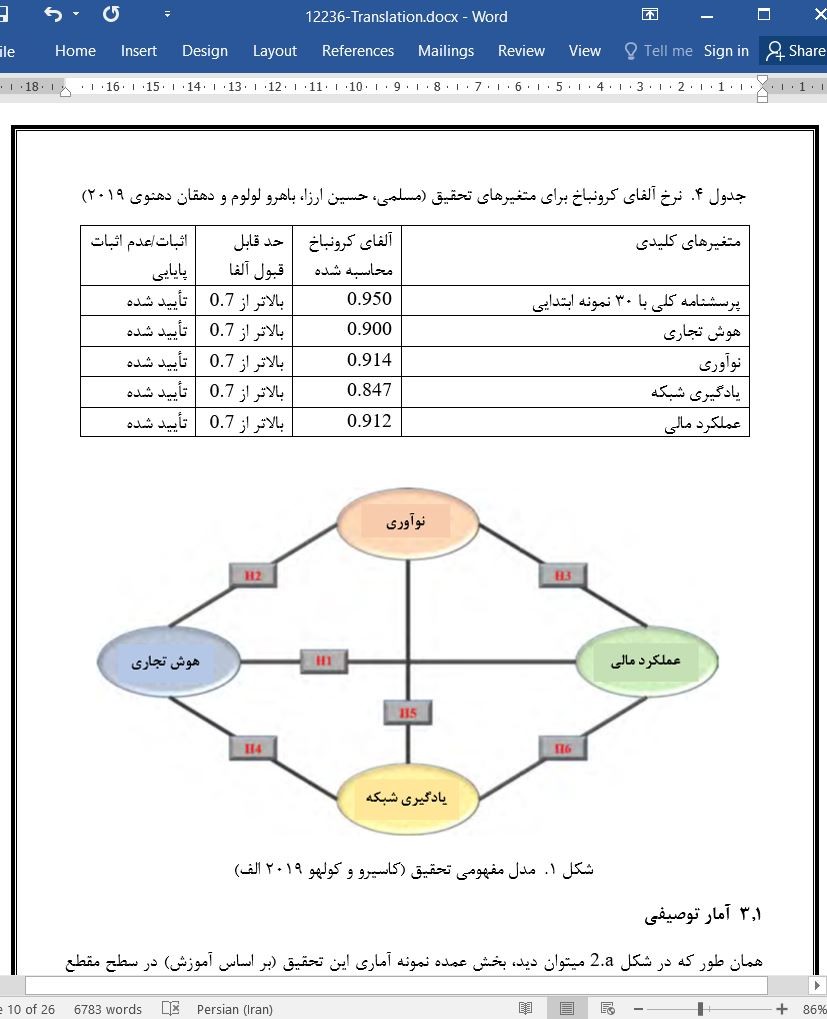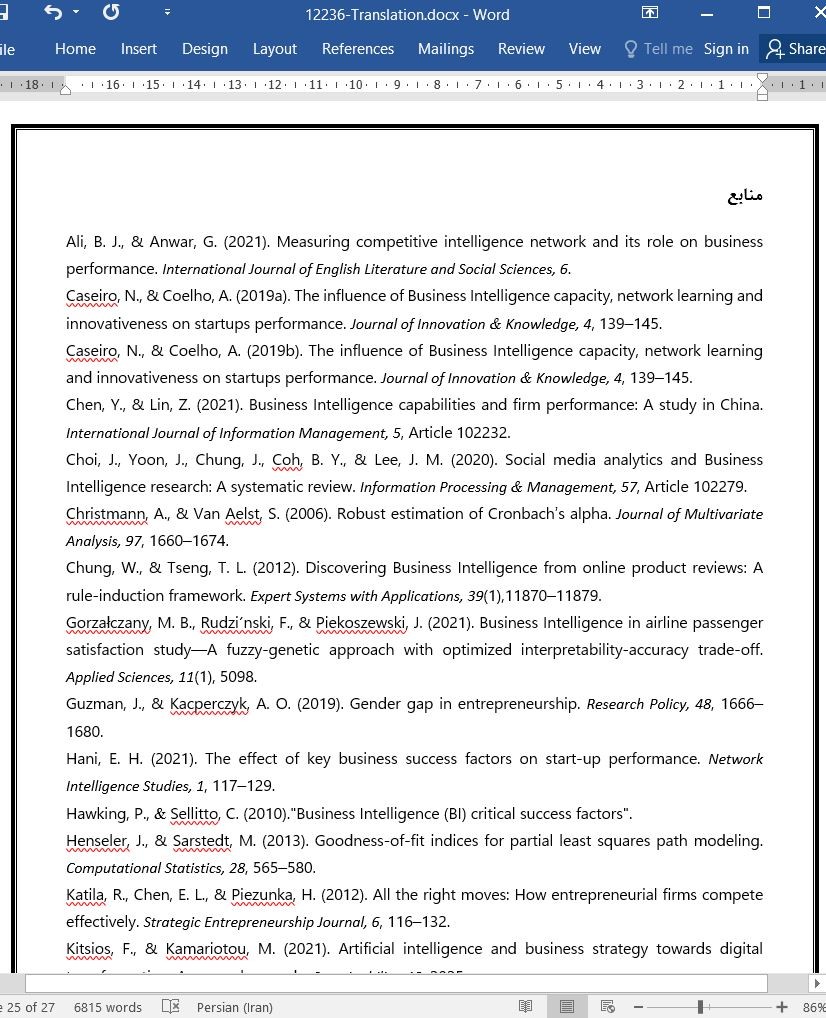
تأثیر هوش تجاری بر روی عملکرد مالی استارت آپ ها
چکیده
هدف هوش تجاری این است که داده های بدست آمده از منابع اطلاعاتی مختلف از مشتریان، محیط، رقبا، بازارها و غیره را بررسی، یکپارچه سازی، (به صورت منطقی) جمع آوری و (به صورت چندبعدی) تحلیل کند تا بتواند عملکرد کسب و کارها و خصوصاً استارت آپ ها را افزایش دهد. هدف تحقیق حاضر این است که تأثیر هوش تجاری بر روی عملکرد مالی استارت آپ ها را مطالعه کند. جدا از هدف عملی، روش استفاده شده بررسی توصیفی است. جمعیت آماری این مطالعه شامل مدیر عاملان و کارشناسان شرکت های استارت آپ است که در یک نمونه متشکل از 250 نفر مورد بررسی قرار گرفتند. همچنین روایی تحلیل عاملی تأییدی را با یک پرسشنامه متشکل از 43 آیتم اعتبارسنجی کردیم و برای جمع آوری داده هم از تحلیل روایی استفاده کردیم. نتایج نشان داد که هوش تجاری روی یادگیری شبکه ای در استارت آپ ها تأثیرگذار نیست اما با این حال هوش تجاری، ابتکار در استارت آپ ها را 0.99 واحد افزایش می دهد و ابتکار نیز به نوبه خود عملکرد مالی استارت آپ ها را 0.311 واحد، یادگیری شبکه برای افزایش ابتکار در استارت آپ ها را 0.632 واحد و یادگیری شبکه درباره افزایش عملکرد مالی در استارت آپ ها را 0.397 واحد افزایش می دهد. تأثیر هوش تجاری بر روی ابتکار و همچنین یادگیری شبکه نیز تأثیر ابتکار و یادگیری شبکه بر روی عملکرد مالی را تأیید کرد. لذا می توانیم نتیجه گیری کنیم که تأثیر هوش تجاری بر روی عملکرد مالی به صورت غیرمستقیم و از طریق نقش واسطه ابتکار و یادگیری شبکه در استارت آپ ها مورد مطالعه قرار گرفته است. جالب این است که این دو عامل برای افزایش عملکرد مالی ضروری هستند.
1. مقدمه
یک استارت آپ یک شرکت است که توسط یک کارآفرین راه اندازی می شود تا یک مدل کسب و کار مقیاس پذیر را بررسی کند، توسعه دهد، و اعتبارسنجی کند (کاتیلا، چن و پیزونکا 2012). حتی با اینکه کارآفرینی به کسب و کارهای جدیدی گفته می شود که شامل خوداشتغالی و کسب و کارهایی هستند که هرگز هدفشان ثبت شدن نیست، اما استارت آپ ها به کسب و کارهای جدیدی گفته می شود که هدفشان تکامل و فراتر رفتن از یک مؤسس منفرد است. یکی از اصول کارآفرینی، توانایی ایجاد ایده های جدید و سودمندی است که مشکلات انسان را حل می کنند (راگووانشی، آگراوال و گاش 2017). کارآفرینان – خصوصاً زمانی که منابع را به شیوه های جدید و متفاوتی ترکیب کنند که یک مزیت رقابتی را نسبت به رقبای خود بدست آورند – میتوانند در خلق ارزش بازار و بهبود عملکردهای مالی و غیرمالی موفق باشند (گازمن و کاکپرزیک 2019). در ضمن اهمیت هوش تجاری در سازمان های امروزی غیرقابل انکار است چون آنها از طریق فراهم سازی اطلاعات برای شرکت ها، توانایی نظارت بر روندها و حرکات بازار رقبا و مشتریان را ایجاد می کنند (واندا و استاین 2015). مهم است که تأثیر هوش تجاری بر روی بهبود قابلیت های یادگیری و نوآوری افراد در یک کسب و کار استارت آپ را مطالعه کنیم که در نهایت روی عملکرد مالی آن تأثیر می گذارد.
4. نتیجه گیری
تأثیر هوش تجاری بر روی عملکرد مالی استارت آپ ها در این مطالعه بررسی شده است. این روش جدا از هدف عملی، یک بررسی توصیفی است. جمعیت آماری این مطالعه مدیر عاملان (CEO) و کارشناسان شرکت های استارت آپ را پوشش می دهد که در یک نمونه متشکل از 250 نفر بررسی شدند. روایی پرسشنامه 43 آیتمی نیز با استفاده از تحلیل عاملی تأییدی ارزیابی شد و برای جمع آوری داده از تحلیل روایی استفاده شد.
Abstract
Business Intelligence goal is to investigate, integrate and logically collect and multidimensional analysis of data from varied customer information sources, environment, competitors, markets, and etc. to enhance the performance of businesses, particularly startups. This research aims to study the impact of Business Intelligence on the financial performance of start-ups. The method is descriptive-survey, aside practical purpose. The study statistical population covered CEOs and experts of startup companies who were investigated in a 250-sample people. Also, 43-item questionnaire aside set up validity with confirmatory factor analysis, and validity analysis was employed for data collection. The results indicated that Business Intelligence did not impact Network Learning in startups, however, Business Intelligence enhanced Innovativeness in startups by 0.99, also, Innovativeness enhanced the financial performance of startups by 0.311, startups intelligence on Network Learning by 0.537, Network Learning on enhancing Innovativeness in startups by 0.632, and Network Learning on financial performance enhancement in startups by 0.397. The impact of Business Intelligence on Innovativeness as well as Network Learning confirmed, also, the impact of Innovativeness and Network Learning on financial performance confirmed. Thus, it can be concluded that the impact of Business Intelligence on financial performance has been studied indirectly through the mediating role of Innovativeness and Network Learning in startups. Surprisingly, these two factors are necessary to enhance financial performance.
1. Introduction
A start-up is a company set in motion by an entrepreneur to explore, develop, and verify a scalable business model (Katila, Chen & Piezunka, 2012). Even though entrepreneurship assigns to new businesses, containing self-employment and businesses that never aim to become registered, start-ups assign to new businesses that aim to evolve beyond the solo founder. One of the principles of entrepreneurship is the ability to create new and useful ideas that solve human problems (Raghuvanshi, Agrawal & Ghosh, 2017). Entrepreneurs, especially when combining resources in new and different ways to gain a competitive advantage over competitors, can succeed in creating market value and improve financial and non-financial performance (Guzman & Kacperczyk, 2019). Meanwhile, the importance of Business Intelligence in today’s organizations is undeniable because they enable the ability to monitor market trends and movements of competitors and customers by providing information to companies (Wanda & Stian, 2015). It is important to study the impact of the Business Intelligence on improving the learning and innovation capabilities of individuals in a start-up business that ultimately affects its financial performance.
4. Conclusion
The Impact of Business Intelligence on the financial performance of Start-ups investigated in this study. The method was descriptive-survey, aside practical purpose. The study statistical population covered CEOs and experts of startup companies who were investigated in a 250-sample people. Also, 43-item questionnaire aside set up validity with confirmatory factor analysis, and validity analysis was employed for data collection.
Business intelligence affects the financial performance of start-ups
Business intelligence has an impact on improving innovation in start-ups
Innovation improves the financial performance of start-ups
Start-up business intelligence affects network learning
Network learning has an impact on improving innovation in start-ups
Network learning has an impact on improving financial performance in start-ups
هوش تجاری بر روی عملکرد مالی استارت آپ ها تأثیر می گذارد
هوش تجاری روی بهیود نوآوری در استارت آپ ها تأثیرگذار است
نوآوری سبب بهبود عملکرد مالی استارت آپ ها می گردد
هوش تجاری استارت آپ ها بر روی یادگیری شبکه تأثیرگذار است
یادگیری شبکه روی بهبود نوآوری در استارت آپ ها تأثیرگذار است
یادگیری شبکه روی بهبود عملکرد مالی در استارت آپ ها تأثیرگذار است
Demographic questions
Business Intelligence
Innovation
Network learning
Financial performance
چکیده
مخفف ها
1. مقدمه
2. بیان مشکل و روشها
2.1 تعاریف واریانس
2.2 عملکرد مالی
2.3 یادگیری شبکه
2.4 روشهای جمع آوری داده
2.5 پایایی ابزار
2.6 توسعه مدل مفهومی
3. نتایج و بحث
3.1 آمار توصیفی
3.2 آمار استنباطی
3.3 ارزیابی عوامل روایی مدل اجرایی تحقیق
3.4 چک کردن روایی برای ابزارهای سنجش
3.5 آزمون الگوی ساختاری
3.6 برازش مدل و روایی سهم
4. نتیجه گیری
منابع
Abstract
1. Introduction
2. Problem statement and methods
2.1. Variation definition
2.2. Financial performance
2.3. Network learning
2.4. Data collection methods
2.5. Tool reliability
2.6. Conceptual model development
3. Results and discussion
3.1. Descriptive statistics
3.2. Inferential statistics
3.3. Evaluating validity factors of research executive model
3.4. Validity check for measuring tools
3.5. Structural pattern test
3.6. Model fit and share validity
4. Conclusion
Acknowledgment
References
- اصل مقاله انگلیسی با فرمت ورد (word) با قابلیت ویرایش
- ترجمه فارسی مقاله با فرمت ورد (word) با قابلیت ویرایش، بدون آرم سایت ای ترجمه
- ترجمه فارسی مقاله با فرمت pdf، بدون آرم سایت ای ترجمه



